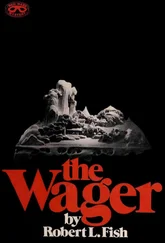Solly shook his head in frustrated desperation. “But, damn it, Barney! Even so! The prices you’re paying for everything! The market keeps going down and you keep buying!”
“Solly,” Barney said quietly, “if the basic proposition is good, the time to buy is on a falling market. Let a rising market take care of itself. In the long run you’ll come out far ahead. People lose opportunities waiting for a market to bottom; they lose money because they’re afraid to lose it. I’ve never been afraid to lose money and that’s why I’ve got what I’m spending today.” Solly stared at him hopelessly. “Now,” Barney said briskly, getting back to business, and avoiding Solly’s baleful glance, “who’s next out there?”
“A chap dressed to the nines,” Solly said a bit vengefully. “And I only hope you don’t buy the Cape Town breakwater from him, or either Windsor Castle or Buckingham Palace!”
“I didn’t know they were for sale,” Barney said with a smile, “but if they are I promise to bid low.” He watched Solly stamp from the room to be replaced by a gray-haired gentleman dressed in the latest fashion. The door closed behind him. Barney motioned the man to a seat and waited until he had been made comfortable. Barney leaned back in his chair, relaxing. “And exactly what do you have to sell?” he asked politely.
The man smiled broadly. “Position,” he said evenly. “Possibly even fame, although I can’t guarantee it. Possibly notoriety, although I can’t guarantee that, either. Recognition, certainly, although you do not require that, being who you are. And all at a reasonable price. My rates are usually sixpence a line, but as an old friend — and one who should be hurt by your failure to remember me, although I am forced to recognize that time works its havoc whether we wish it or not — I have come to offer my services for what they might be worth. Possibly nothing. Possibly a bit more.”
Barney frowned across the desk. This was far different from the normal approach he had become used to in the past month, although he had to admit he had faced more than one ingenious ploy. “I beg your pardon?”
“For not recognizing me?” The man carefully rucked one trouser leg several inches upward before crossing his legs; he glanced down to satisfy himself there were no creases that might provide future and unsightly wrinkles, and then looked up with a slightly accusatory frown, although his eyes were twinkling. “I suppose you should be forgiven, considering the lapse of time. I can only gather that you are not in the habit of saving calling cards, my young Mr. Isaacs. Actually, I don’t myself. They take up so much room in filing cabinets, and when you run across them years later you say to yourself — with much the frown you have on your face at present — who the devil was that? Why did the dreadful bore give me his card in the first place? And then, quite properly, you tear it in shreds and throw it away.”
Barney stared. “I’m afraid—”
“Cape Town,” the man said, smiling. “A large area next to the Castle. People milling about like mad, and a young boy trying to figure out how to get to Kimberley on a rather restricted budget, I imagine—”
Barney came to his feet, beaming. “Mr. Breedon!”
“Well, at least the name made an impression,” Breedon said, and smiled across the desk. “In all honesty, my young friend, I’m more than gratified that you remember me at all. After all, our conversation lasted only a few moments. And it’s been — what? — twenty years?”
“Mr. Breedon!” Barney hurried around the desk, his hand out to greet the elderly man. “It’s truly good to see you! My first good word in this country came from you. And I’ve never forgotten!”
“Nor have I. Nor your Shakespearean recitations.” His eyebrows rose humorously. “Your accent has improved. Or at least changed.”
Barney grinned broadly and went into his old Cockney. “Eee, I married a ’ard woman, y’can take me word fer it!” He put away the Cockney. “The Bard said, in Hamlet , ‘Frailty, thy name is woman!’ Well, he didn’t know my Fay, and that’s the truth.” He dropped his light tone. “I’m glad you’re here, Mr. Breedon. You offered money to an absolute stranger, a young boy you knew you might never see again.”
“A loan the boy refused.”
Barney shook his head. “That makes no difference.” He returned to his chair and leaned back in it, considering Breedon across the wide desk. “I’ve never forgotten that. And whatever I can do for you, in Johannesburg or Kimberley, will be done. Just say the word.”
Breedon looked a bit embarrassed. “Well, to tell the truth, I do need a favor of sorts to ask—”
“Just name it! Do you need money?”
Breedon laughed. It was a laugh of such enjoyment, such pleasure, that Barney stared at him. Breedon shook his head.
“I suppose I should be more flattered than anything else at your offer, since I try very hard to maintain my privacy. While it is undoubtedly true I am not as rich as Barney Barnato, I’m afraid the wolf comes to my door, sniffs a bit, and then wanders off a trifle discouraged. No, Barney, I came to ask you for something more precious, possibly, than your money. I came to ask you for your time.”
Barney frowned, now thoroughly confused. “My time?”
“Yes. I came to ask you to run for the Cape Assembly.”
Barney’s frown turned to puzzlement.
“There are no Assembly representatives from Johannesburg, I’m sure you know that. We’re part of the Transvaal, not the Cape Colony.” He smiled faintly, but there was little humor in his smile. “I doubt that Oom Paul Kruger would be pleased to have us think otherwise; his Boer commandos would be at the voting booths and they wouldn’t be there to vote, at least not with ballots. Bullets, maybe.”
“I’m quite aware of that, of course,” Breedon said, his eyes sharp on Barney’s face. “But Kimberley is still a part of the Cape Colony, and I understand you still have a home there, as well as many friends, and a great many interests.”
Barney looked at the man thoughtfully. “Mr. Breedon,” he said at last, “your name is not as unknown to me as you may think. I do know something about you. When I offered you money a few moments ago, I thought possibly you might have fallen upon temporary hard times; it happens to the best. They tell me publishing is a risky business at best; it’s one of the reasons I’ve stayed out of it. But still, as I understand it, your principal interests are in Cape Town—”
“And in Bloemfontein and in Pretoria, and although it is not generally known — nor need it be — I also own a good share of the local newspaper here in Johannesburg. No, Mr. Barnato — Barney — I am a newspaper publisher and I have interests in all parts of South Africa, and major ones in the Transvaal and the Orange Free State. I am also of Dutch parentage. And I feel that a strong voice in the Cape Assembly will be needed very shortly, a voice with reputation and influence, to counteract, if you will, the influence of certain parties who seem intent upon fostering trouble between the Boers and the English.”
Barney stared at the man, his face expressionless. “And what makes you think I disagree with — these certain parties?”
Breedon smiled gently. “You insult me, Barney. I am a newspaper publisher and it’s true I spend most of my time behind a desk, but I am also a newspaper reporter, and if I say so myself a rather good one. I did not come to see you without having done a decent amount of investigating. I am as sure you agree with my point of view as I am that I am sitting here. Otherwise, I assure you I would not be sitting here.”
Barney swung his chair to stare from the window. In the distance he could see the long low but rising yellow slag heaps that dotted the landscape of the Reef, and the peaceful rolling hills beyond, touched with light fleecy clouds. It was an idyllic scene and one he knew could change radically in a very short time. He knew exactly what Breedon was talking about; he heard the hotheads of the so-called Reform Committee spouting their talk of possible revolution or even outright war every day in the Rand Club, and had argued often enough with them. But politics was not his game, mining and finance were. And what could or would one voice matter in the Cape Assembly if these rash fools were to insist upon trouble?
Читать дальше










